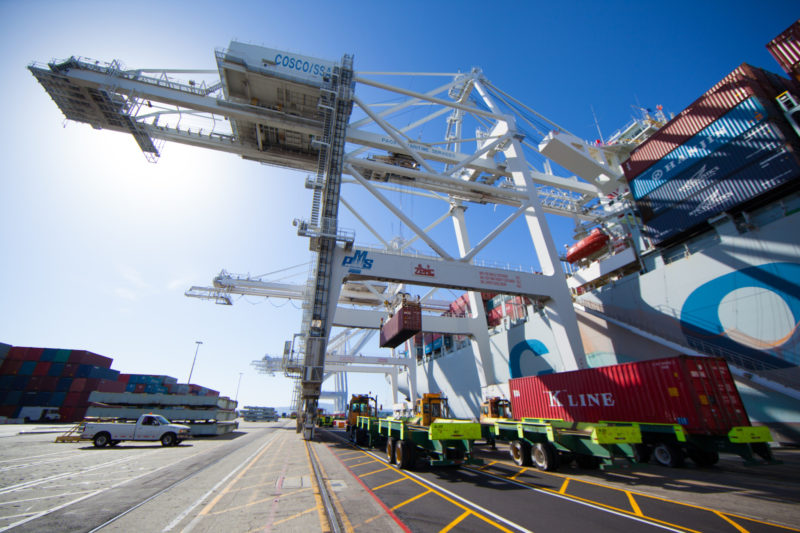The Port of Long Beach, Calif., kicked off a pilot project introducing zero-emission electric cranes and hybrid vehicles for cargo handling, part of an aggressive plan to reduce air pollution there and the nearby Port of Los Angeles by 2030.
The state that has the strictest air pollution limits for cars is likewise leading a push to cut emissions at its seaports, a policy that has West Coast workboat operators, designers and shipbuilders pressing forward with Tier 4 diesel engines and hybrid electric propulsion in their latest projects.
A $9.7 million grant from the California Energy Commission is funding the one-year project at Long Beach, which will bring 25 vehicles that are zero- or near zero-emissions to marine terminals to test their performance in a real-world setting. The launch event was held at Pacific Container Terminal at Long Beach’s Pier J — operated by SSA Terminals — one of three terminals participating in the project.
A 2017 clean air plan update by the southern California port operators set a goal for transitioning all their terminal equipment to zero emissions power by 2030. Long Beach officials said their pilot program is the largest of its kind in the nation.
“The Zero-Emissions Terminal Transition Project kicks off a new era in transportation electrification and the Port’s own transformation to zero-emissions,” said Long Beach Harbor Commission President Lou Anne Bynum. “We are grateful for the partnerships with the Energy Commission and Southern California Edison that are making this a reality.”
“This project is another example of the goods movement industry, equipment builders, utilities and public agencies stepping up to reach for the goal of zero emissions,” said Mario Cordero, Port of Long Beach Executive Director. “Today, you can see how everyone is coming together to meet that challenge.”
The project will involve converting nine diesel-electric, rubber-tire gantry cranes into fully electric equipment at one terminal, the purchase of 12 battery-electric yard tractors for two more terminals, and the conversion of four liquefied natural gas (LNG) fueled trucks into plug-in hybrid-electric trucks for a drayage trucking firm.
“SSA Terminals appreciates the confidence that the Port of Long Beach has shown in our company by selecting us to be part of this major project to electrify the nine large container-handling yard cranes at our Pacific Container Terminal," said Paul Gagnon, Vice President of SSA Marine Terminals. “We hope that this partnership will continue as we all strive for cleaner air quality.”
The yearlong test is anticipated to reduce greenhouse gases by more than 1,323 tons and nitrogen oxides — an ingredient of southern California smog — by 27 tons each year. Switching to the new equipment is also expected to save more than 270,000 gals. of diesel fuel.




